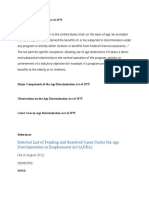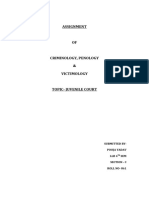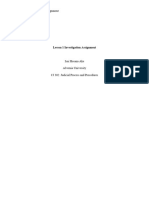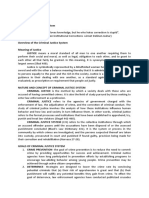0 ratings0% found this document useful (0 votes)
21 viewsLecture 3
Lecture 3
Uploaded by
Sam UdumaThis document summarizes key aspects of arrest and custody procedures from the 11th edition of Procedures in the Justice System. It discusses definitions of arrest, types of arrests by private citizens or law enforcement, requirements for probable cause and warrants, search incident to arrest standards, territorial jurisdiction for arrests, use of reasonable force, Miranda warnings and exceptions, and immunities from arrest.
Copyright:
© All Rights Reserved
Available Formats
Download as PDF, TXT or read online from Scribd
Lecture 3
Lecture 3
Uploaded by
Sam Uduma0 ratings0% found this document useful (0 votes)
21 views23 pagesThis document summarizes key aspects of arrest and custody procedures from the 11th edition of Procedures in the Justice System. It discusses definitions of arrest, types of arrests by private citizens or law enforcement, requirements for probable cause and warrants, search incident to arrest standards, territorial jurisdiction for arrests, use of reasonable force, Miranda warnings and exceptions, and immunities from arrest.
Original Description:
Criminal Justice Procedures Lecture 3
Copyright
© © All Rights Reserved
Available Formats
PDF, TXT or read online from Scribd
Share this document
Did you find this document useful?
Is this content inappropriate?
This document summarizes key aspects of arrest and custody procedures from the 11th edition of Procedures in the Justice System. It discusses definitions of arrest, types of arrests by private citizens or law enforcement, requirements for probable cause and warrants, search incident to arrest standards, territorial jurisdiction for arrests, use of reasonable force, Miranda warnings and exceptions, and immunities from arrest.
Copyright:
© All Rights Reserved
Available Formats
Download as PDF, TXT or read online from Scribd
Download as pdf or txt
0 ratings0% found this document useful (0 votes)
21 views23 pagesLecture 3
Lecture 3
Uploaded by
Sam UdumaThis document summarizes key aspects of arrest and custody procedures from the 11th edition of Procedures in the Justice System. It discusses definitions of arrest, types of arrests by private citizens or law enforcement, requirements for probable cause and warrants, search incident to arrest standards, territorial jurisdiction for arrests, use of reasonable force, Miranda warnings and exceptions, and immunities from arrest.
Copyright:
© All Rights Reserved
Available Formats
Download as PDF, TXT or read online from Scribd
Download as pdf or txt
You are on page 1of 23
Procedures in the Justice System
ELEVENTH EDITION
CHAPTER 3
Arrest and Custody
Copyright © 2016, 2012, 2010
Procedures in the Justice System, 11e
by Pearson Education, Inc.
Roberson | Wallace
All Rights Reserved
Arrest of the Law Violator
• An arrest has been defined as the
taking of a person into custody in the
manner authorized by law.
• Private person arrest
The arrest by a private person is
sometimes referred to as a citizen's
arrest.
continued on next slide
Copyright © 2016, 2012, 2010
Procedures in the Justice System, 11e
by Pearson Education, Inc.
Roberson | Wallace
All Rights Reserved
Arrest of the Law Violator
• Arrest by a law enforcement officer
A person employed by some branch of
the government and sworn to uphold
the laws
Copyright © 2016, 2012, 2010
Procedures in the Justice System, 11e
by Pearson Education, Inc.
Roberson | Wallace
All Rights Reserved
Arrests and Warrants
• Must have probable cause to arrest
• There are two elements to probable
cause to arrest:
There is reason to believe that a crime
has been committed.
The person to be arrested committed
the offense.
• Arrest without a warrant
Most common form of arrest
continued on next slide
Copyright © 2016, 2012, 2010
Procedures in the Justice System, 11e
by Pearson Education, Inc.
Roberson | Wallace
All Rights Reserved
Arrests and Warrants
• Unless there are exigent or emergency
circumstances or consent, the police
may not enter a private home to make
a warrantless arrest.
• Arrest with a warrant
Many states require officers to have
warrants of arrest for misdemeanors
committed outside of their presence.
continued on next slide
Copyright © 2016, 2012, 2010
Procedures in the Justice System, 11e
by Pearson Education, Inc.
Roberson | Wallace
All Rights Reserved
Arrests and Warrants
• Search of an arrested person
Chimel v. California
Arizona v. Gant
Copyright © 2016, 2012, 2010
Procedures in the Justice System, 11e
by Pearson Education, Inc.
Roberson | Wallace
All Rights Reserved
Territorial Jurisdiction to Make an
Arrest
• Authority to make an arrest
In most states, the territorial
jurisdiction of the city police is confined
to the city limits.
continued on next slide
Copyright © 2016, 2012, 2010
Procedures in the Justice System, 11e
by Pearson Education, Inc.
Roberson | Wallace
All Rights Reserved
Territorial Jurisdiction to Make an
Arrest
• Uniform Act of Fresh Pursuit
Provides that a peace officer of one
state may enter another state in fresh
pursuit to arrest an offender who has
committed a felony
Limited arrest powers
continued on next slide
Copyright © 2016, 2012, 2010
Procedures in the Justice System, 11e
by Pearson Education, Inc.
Roberson | Wallace
All Rights Reserved
Territorial Jurisdiction to Make an
Arrest
• State police agencies
All states except Hawaii have some type
of state police.
State police agencies have statewide
territorial jurisdiction.
continued on next slide
Copyright © 2016, 2012, 2010
Procedures in the Justice System, 11e
by Pearson Education, Inc.
Roberson | Wallace
All Rights Reserved
Territorial Jurisdiction to Make an
Arrest
• Federal law enforcement agencies
A number of federal investigative
agencies have emergency arrest
powers.
All federal officers have territorial
jurisdiction throughout the United
States.
Copyright © 2016, 2012, 2010
Procedures in the Justice System, 11e
by Pearson Education, Inc.
Roberson | Wallace
All Rights Reserved
Force in Effecting an Arrest
• Any peace officer who has reasonable
cause to believe that the person to be
arrested has committed a public
offense may use reasonable force to
effect the arrest, to prevent escape, or
to overcome resistance.
• Title 18 U.S. Code, Section 242
• Title 42 U.S. Code, Section 1983
• Tennessee v. Garner
continued on next slide
Copyright © 2016, 2012, 2010
Procedures in the Justice System, 11e
by Pearson Education, Inc.
Roberson | Wallace
All Rights Reserved
Force in Effecting an Arrest
• Calling for assistance
Summons
• Resisting arrest
It is a violation to willfully resist, delay,
or obstruct a peace officer in the
performance of his or her duty,
including making an arrest.
Copyright © 2016, 2012, 2010
Procedures in the Justice System, 11e
by Pearson Education, Inc.
Roberson | Wallace
All Rights Reserved
Miranda and Its Effect
• Miranda v. Arizona
• Pre-Miranda techniques
Brown v. Mississippi
Ashcraft v. Tennessee
Spano v. New York
Escobedo v. Illinois
• Miranda safeguards
continued on next slide
Copyright © 2016, 2012, 2010
Procedures in the Justice System, 11e
by Pearson Education, Inc.
Roberson | Wallace
All Rights Reserved
Miranda and Its Effect
• Miranda established a four-prong test
that must be satisfied before a
suspect's statements can be admitted
into evidence.
The test requires affirmative answers to
all four of the following questions:
1. Was the statement voluntary?
2. Was the Miranda warning given?
continued on next slide
Copyright © 2016, 2012, 2010
Procedures in the Justice System, 11e
by Pearson Education, Inc.
Roberson | Wallace
All Rights Reserved
Miranda and Its Effect
• Miranda established a four-prong test
that must be satisfied before a
suspect's statements can be admitted
into evidence.
The test requires affirmative answers to
all four of the following questions:
3. Was there a waiver by the suspect?
4. Was the waiver intelligent and
voluntary?
continued on next slide
Copyright © 2016, 2012, 2010
Procedures in the Justice System, 11e
by Pearson Education, Inc.
Roberson | Wallace
All Rights Reserved
Miranda and Its Effect
• Eroding of Miranda
Harris v. New York
Illinois v. Perkins
Moran v. Burbine
New York v. Quarles
Copyright © 2016, 2012, 2010
Procedures in the Justice System, 11e
by Pearson Education, Inc.
Roberson | Wallace
All Rights Reserved
Immunity from Arrest
• Diplomatic immunity
Diplomatic officers
• Consular immunity
Limited to acts in performance of their
duties, the immunity does not include
members of their families or servants
• Legislative immunity
• Out-of-state witnesses
Copyright © 2016, 2012, 2010
Procedures in the Justice System, 11e
by Pearson Education, Inc.
Roberson | Wallace
All Rights Reserved
Booking
• Consists of recording the arrest in
official law enforcement records,
fingerprinting, and photographing the
accused
• Right to telephone calls
Copyright © 2016, 2012, 2010
Procedures in the Justice System, 11e
by Pearson Education, Inc.
Roberson | Wallace
All Rights Reserved
Issuance of a Citation
• A citation (sometimes referred to as a
summons) is a written notice issued to
a violator to appear in court.
• In most instances, a citation will be
issued for an infraction and for a traffic
violation.
continued on next slide
Copyright © 2016, 2012, 2010
Procedures in the Justice System, 11e
by Pearson Education, Inc.
Roberson | Wallace
All Rights Reserved
Issuance of a Citation
• Citation court procedure
The citation will become the accusatory
document, eliminating the necessity of
the officer's filing a complaint.
Copyright © 2016, 2012, 2010
Procedures in the Justice System, 11e
by Pearson Education, Inc.
Roberson | Wallace
All Rights Reserved
Summons
• The true summons is issued by a judge
in lieu of a warrant of arrest.
• A summons differs from a citation in
that a summons is issued by a judge
and either mailed to or served upon the
accused personally, commanding his or
her appearance; a citation is generally
issued by an officer in the field.
Copyright © 2016, 2012, 2010
Procedures in the Justice System, 11e
by Pearson Education, Inc.
Roberson | Wallace
All Rights Reserved
Case Law
• United States v. Lall
• Melendez-Diaz v. Massachusetts
Copyright © 2016, 2012, 2010
Procedures in the Justice System, 11e
by Pearson Education, Inc.
Roberson | Wallace
All Rights Reserved
Summary
• Arrests may be made with a warrant.
• Arrests may be made with probable
cause without a warrant under certain
conditions.
• Police may use a reasonable amount of
force legally to effect an arrest.
• Miranda v. Arizona gave some
protections to the accused related to
interrogations.
Copyright © 2016, 2012, 2010
Procedures in the Justice System, 11e
by Pearson Education, Inc.
Roberson | Wallace
All Rights Reserved
You might also like
- Fluted Pumpkin (Ugu) : Telfaira OccidentalisDocument9 pagesFluted Pumpkin (Ugu) : Telfaira OccidentalisSam UdumaNo ratings yet
- Juvenile Delinquency and Crime PreventionDocument13 pagesJuvenile Delinquency and Crime PreventionApple Blando100% (3)
- Good Samaritan Drug Overdose Act Fact SheetDocument2 pagesGood Samaritan Drug Overdose Act Fact SheetAnonymous HXNVTOXK78100% (1)
- The Age Discrimination Act of 1975Document15 pagesThe Age Discrimination Act of 1975Sam UdumaNo ratings yet
- Topic 4 Search and SeizureDocument12 pagesTopic 4 Search and Seizureyeo8joanneNo ratings yet
- Lecture 4Document14 pagesLecture 4Sam UdumaNo ratings yet
- Lecture 2Document18 pagesLecture 2Sam UdumaNo ratings yet
- Juvenile Delinquency (Sec. II)Document58 pagesJuvenile Delinquency (Sec. II)mufarrah.bukhariNo ratings yet
- Post Sentencing Considerations20368Document19 pagesPost Sentencing Considerations20368u3257735No ratings yet
- 20.05 Honolulu Sign-OnDocument4 pages20.05 Honolulu Sign-OnKyle BarryNo ratings yet
- Black Brown Elegant Lawyer PresentationDocument5 pagesBlack Brown Elegant Lawyer PresentationRed LoveNo ratings yet
- Adult vs. Juvenile Court System - EditedDocument6 pagesAdult vs. Juvenile Court System - EditedZeekes DavidsNo ratings yet
- Correction Pillar 2Document46 pagesCorrection Pillar 2Harren SajaNo ratings yet
- William Fajar AL-Falah (Tugas 1) 043470464Document2 pagesWilliam Fajar AL-Falah (Tugas 1) 043470464Willy AlfalahNo ratings yet
- Legal Medicine 1.4 Overview of The Philippine Judicial SystemDocument3 pagesLegal Medicine 1.4 Overview of The Philippine Judicial SystemroarmikeNo ratings yet
- FAQs On Land OwnershipDocument61 pagesFAQs On Land OwnershipRyan OdioNo ratings yet
- L6 PolicePowersSuspects'Rights 2021 SlidesDocument35 pagesL6 PolicePowersSuspects'Rights 2021 SlidesÁngela LirolaNo ratings yet
- Parole: Ca 2 - Non-Institutional CorrectionsDocument8 pagesParole: Ca 2 - Non-Institutional CorrectionsWena Mae Cristobal100% (6)
- IELTS Crime & Law Vocabulary PDFDocument3 pagesIELTS Crime & Law Vocabulary PDFM B100% (1)
- SALC Sex Workers Rights Pamphlet - Eswatini Draft 5 - POLICEDocument2 pagesSALC Sex Workers Rights Pamphlet - Eswatini Draft 5 - POLICEserenafox23No ratings yet
- Theme 6Document36 pagesTheme 6nokwambatha18No ratings yet
- POCSO ACT FinalDocument47 pagesPOCSO ACT FinalnishaNo ratings yet
- Journal Chapter 12Document1 pageJournal Chapter 12api-289276366No ratings yet
- Juvenile Delinquency and Crime PreventionDocument14 pagesJuvenile Delinquency and Crime PreventionJuaton, Aaron JornelNo ratings yet
- Amity University Rajasthan: Criminal Law Hons. AssignmentDocument9 pagesAmity University Rajasthan: Criminal Law Hons. AssignmentSahida ParveenNo ratings yet
- CH.1 ReviewDocument1 pageCH.1 ReviewAJ PowellNo ratings yet
- Assignment: Submitted By-Pooja Yadav LLB 4 SEM Section - C ROLL NO - 861Document8 pagesAssignment: Submitted By-Pooja Yadav LLB 4 SEM Section - C ROLL NO - 861Pooja YadavNo ratings yet
- Assignment: Submitted By-Pooja Yadav LLB 4 SEM Section - C ROLL NO - 861Document7 pagesAssignment: Submitted By-Pooja Yadav LLB 4 SEM Section - C ROLL NO - 861Pooja YadavNo ratings yet
- Theme 1 SlidesDocument43 pagesTheme 1 Slidesnokwambatha18No ratings yet
- Lecture #14 Juvenile 22 AccDocument36 pagesLecture #14 Juvenile 22 AccprocmadzNo ratings yet
- ParoleDocument21 pagesParoleJhon Klinton Ani EscoroNo ratings yet
- Criminal Justice System-1Document14 pagesCriminal Justice System-1api-302395215No ratings yet
- Obstructing JusticeDocument29 pagesObstructing JusticeWHYY NewsNo ratings yet
- Apa Style Paper ExampleDocument6 pagesApa Style Paper ExampleanayaNo ratings yet
- Hinds County Findings LetterDocument29 pagesHinds County Findings LetterUploadedbyHaroldGaterNo ratings yet
- Parole and Probation AdministrationDocument20 pagesParole and Probation Administration2jkx6nhp47No ratings yet
- Introduction To Criminal Justice System-REVIEWERDocument12 pagesIntroduction To Criminal Justice System-REVIEWERLeo james BosiNo ratings yet
- Under The Supervision of Prof. Smita SatapathyDocument18 pagesUnder The Supervision of Prof. Smita SatapathySai Srinivas ReddyNo ratings yet
- Arrested DevelopmentDocument20 pagesArrested DevelopmentScripps Howard News ServiceNo ratings yet
- Constitutional Regulation of Business: Davidson, Knowles & Forsythe Ed.)Document19 pagesConstitutional Regulation of Business: Davidson, Knowles & Forsythe Ed.)Vikram Waraich InsanNo ratings yet
- BailDocument14 pagesBail689308No ratings yet
- Justice Mario V. Lopez - Supreme Court of The PhilippinesDocument6 pagesJustice Mario V. Lopez - Supreme Court of The PhilippinesGfor FirefoxonlyNo ratings yet
- Free - Speech - and - Street - Evangelism (The Christian Institute)Document4 pagesFree - Speech - and - Street - Evangelism (The Christian Institute)spaghettipaulNo ratings yet
- Bill Summary - Juvenile JusticeDocument2 pagesBill Summary - Juvenile JusticeHanul ChoudharyNo ratings yet
- Bill Summary - Juvenile JusticeDocument2 pagesBill Summary - Juvenile Justiceharvir singhNo ratings yet
- Crime Policy EvaluationDocument5 pagesCrime Policy EvaluationJack SikoliaNo ratings yet
- Review Material in Juvenile DelinquencyDocument6 pagesReview Material in Juvenile DelinquencyEmerson TeeNo ratings yet
- Lawyer Defense Criminal Activity Indigent Public Defenders Consent DecreesDocument2 pagesLawyer Defense Criminal Activity Indigent Public Defenders Consent DecreesColeenNo ratings yet
- Crim Integclj 1 ReportDocument58 pagesCrim Integclj 1 Reportkaila zaparitaNo ratings yet
- CRPC ProjectDocument9 pagesCRPC Projectpintu ramNo ratings yet
- Ielts 10 - 07-07Document4 pagesIelts 10 - 07-07Thảo PhươngNo ratings yet
- A Prosecutor Role - EditedDocument3 pagesA Prosecutor Role - EditedDuncan MuthamiNo ratings yet
- Writing SampleDocument4 pagesWriting SampleLochana HegdeNo ratings yet
- Atty KhoDocument2 pagesAtty KhoEti Villanueva IIINo ratings yet
- Castration As A Punishment For RapeDocument17 pagesCastration As A Punishment For RapeShreshtha Verma0% (1)
- Gawaing BCPC - RA 9344Document77 pagesGawaing BCPC - RA 9344Arnel OlsimNo ratings yet
- State Trends Legislative Victories From 2011-2013 Removing Youth From The Adult Criminal Justice System (October 2013)Document16 pagesState Trends Legislative Victories From 2011-2013 Removing Youth From The Adult Criminal Justice System (October 2013)aprillt100% (1)
- Bail Reform Paper FINAL-V1Document14 pagesBail Reform Paper FINAL-V1Jesse JenkinsNo ratings yet
- Chapter 10 Crime and The Criminal Justice SystemDocument24 pagesChapter 10 Crime and The Criminal Justice SystemnewtestamentafaNo ratings yet
- Prison Administration SHIVAM 1020202126Document18 pagesPrison Administration SHIVAM 1020202126Shivam TiwaryNo ratings yet
- Black Lives, White Law: Locked Up and Locked Out in AustraliaFrom EverandBlack Lives, White Law: Locked Up and Locked Out in AustraliaNo ratings yet
- Linkage Between WORKTECH and STEMDocument5 pagesLinkage Between WORKTECH and STEMSam UdumaNo ratings yet
- CJ422 Syllabus Master Locked (3) 2023 (5311)Document9 pagesCJ422 Syllabus Master Locked (3) 2023 (5311)Sam UdumaNo ratings yet
- The Society and The MediaDocument3 pagesThe Society and The MediaSam UdumaNo ratings yet
- Lesson 1 Investigation AssignmentDocument11 pagesLesson 1 Investigation AssignmentSam UdumaNo ratings yet
- Trauma On The Job Paper 1Document5 pagesTrauma On The Job Paper 1Sam UdumaNo ratings yet
- 2nd Term Second CA Test Maths JS3Document1 page2nd Term Second CA Test Maths JS3Sam UdumaNo ratings yet
- 2nd Term Second CA Test Maths SS1Document1 page2nd Term Second CA Test Maths SS1Sam UdumaNo ratings yet
- Final Paper 3Document11 pagesFinal Paper 3Sam UdumaNo ratings yet
- Response 1 To Discussion 1 Victim ImpactDocument1 pageResponse 1 To Discussion 1 Victim ImpactSam UdumaNo ratings yet
- Final Paper 1Document5 pagesFinal Paper 1Sam UdumaNo ratings yet
- This Study Resource Was: Ebp - Section F: Implementation Plan 1Document5 pagesThis Study Resource Was: Ebp - Section F: Implementation Plan 1Sam UdumaNo ratings yet
- Employment LetterDocument1 pageEmployment LetterSam UdumaNo ratings yet
- Snail Farming: Glorytime Animal Products LTD Abudu Aina Estate, Opposite WAPCO Sagamu, Ogun StateDocument10 pagesSnail Farming: Glorytime Animal Products LTD Abudu Aina Estate, Opposite WAPCO Sagamu, Ogun StateSam UdumaNo ratings yet
- Unit 8 Discussion Board-Career AspirationDocument2 pagesUnit 8 Discussion Board-Career AspirationSam UdumaNo ratings yet
- FFT Sri Lanka Report v5 LRDocument20 pagesFFT Sri Lanka Report v5 LRThavam RatnaNo ratings yet
- Harvey vs. Commissioner, 162 SCRA 840 Case DigestDocument2 pagesHarvey vs. Commissioner, 162 SCRA 840 Case DigestcherrymeaNo ratings yet
- Bhartiya Nayyayik Suraksha Sanhita 2023Document40 pagesBhartiya Nayyayik Suraksha Sanhita 2023Rajat KaushikNo ratings yet
- 191 People v. Mengote - 210 SCRA 174Document10 pages191 People v. Mengote - 210 SCRA 174Jeunice VillanuevaNo ratings yet
- People v. MariacosDocument3 pagesPeople v. MariacosVian O.No ratings yet
- 6 People vs. VillarealDocument2 pages6 People vs. VillarealAbigail Tolabing100% (2)
- 23-041 - Rep. Maryam Khan ReportDocument52 pages23-041 - Rep. Maryam Khan ReportEditor, Hartford CourantNo ratings yet
- Remedial Law Review Pagalilauan Final Exams TomottorDocument3 pagesRemedial Law Review Pagalilauan Final Exams TomottorJea CoNo ratings yet
- VSO General Orders ManualDocument1,050 pagesVSO General Orders ManualThomas MatesNo ratings yet
- Right To LLS, Warrantless Arrest, Search and Seizure, and Right To PrivacyDocument49 pagesRight To LLS, Warrantless Arrest, Search and Seizure, and Right To PrivacyNoel Ephraim Antigua100% (3)
- People v. MontillaDocument8 pagesPeople v. MontillaJolessa Mie SalcedoNo ratings yet
- RAMIREZ - GARCIA PADILLA vs. ENRILE PDFDocument3 pagesRAMIREZ - GARCIA PADILLA vs. ENRILE PDFBeatta RamirezNo ratings yet
- (U) Daily Activity Report: Marshall DistrictDocument5 pages(U) Daily Activity Report: Marshall DistrictFauquier NowNo ratings yet
- Power of Courts To Seize PassportDocument2 pagesPower of Courts To Seize PassportIntern VSPNo ratings yet
- Chapters 3 & 4Document25 pagesChapters 3 & 4Arriane Steph ZapataNo ratings yet
- People vs. BeranDocument1 pagePeople vs. BeranJohn Dexter FuentesNo ratings yet
- Homeland Committee GOP To DHS On Jose IbarraDocument2 pagesHomeland Committee GOP To DHS On Jose IbarraFox News100% (1)
- PARLIAMENT OF Owls Refined PremierDocument3 pagesPARLIAMENT OF Owls Refined Premierpaul sonNo ratings yet
- Pre-Board Examination Correctional Administration Instruction: Select The Best Possible AnswerDocument8 pagesPre-Board Examination Correctional Administration Instruction: Select The Best Possible AnswerAlemar EmilianoNo ratings yet
- (U) Daily Activity Report: Marshall DistrictDocument5 pages(U) Daily Activity Report: Marshall DistrictFauquier NowNo ratings yet
- Leon County Sheriff'S Office Daily Booking Report 9-Sep-2020 Page 1 of 2Document2 pagesLeon County Sheriff'S Office Daily Booking Report 9-Sep-2020 Page 1 of 2WCTV Digital Team50% (2)
- (U) Daily Activity Report: Marshall DistrictDocument6 pages(U) Daily Activity Report: Marshall DistrictFauquier NowNo ratings yet
- CDI 1 - Module 3Document9 pagesCDI 1 - Module 3mariavillaflorNo ratings yet
- CDI 101 Module No. 4Document13 pagesCDI 101 Module No. 4Shy OreoNo ratings yet
- (U) Daily Activity Report: Marshall DistrictDocument5 pages(U) Daily Activity Report: Marshall DistrictFauquier NowNo ratings yet
- Ps5-Spot Report-Owp-Oct 24, 2024-Rogene Parot BlancoDocument2 pagesPs5-Spot Report-Owp-Oct 24, 2024-Rogene Parot BlancoletticelagansuaNo ratings yet
- XXXXXXDocument8 pagesXXXXXXhsagunNo ratings yet
- Dacanay v. PeopleDocument1 pageDacanay v. PeopleJamiah Obillo HulipasNo ratings yet
- Ca1 ReviewerDocument7 pagesCa1 ReviewerReyshell Sombise Del RosarioNo ratings yet









































































































